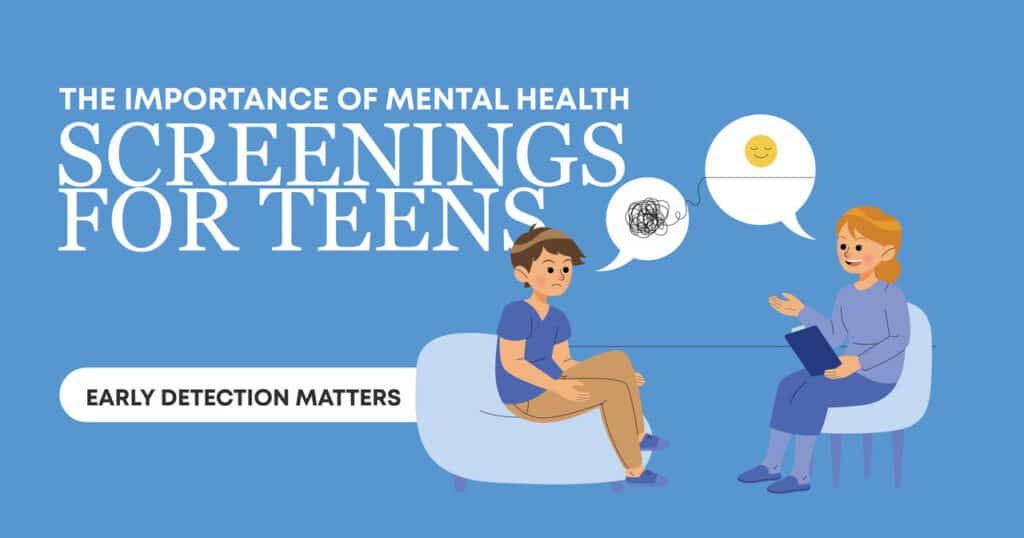Adolescence is one of those sensitive periods during which a lot happens in the body and the mind. When school pressure, relationships, and changes in the social landscape are dramatic, it results in too much stress. It may be the first time mental health problems surface.
For most adolescents, these stressors are inexpressible or even unrecognized, making teen mental health screenings so crucial. Mental health checkups for teens can help detect early stages or even the existence of possible underlying problems such as anxiety, depression, or other mental health conditions before their situation worsens.
Why Mental Health Screenings Are Crucial During Adolescence
By adolescence, a teenage brain is still developing and likely to experience a lot of physical, emotional, and social change. At these times, they are more vulnerable to mental illness, primarily anxiety and depression, increased diagnoses of which appear in many teenagers. But, of course, this by no means applies to all teens. Many teens do not have a way of knowing that what they feel may be an underlying issue.
The importance of mental health screenings for teens should never be underestimated. Early diagnosis of the battling condition in mental health makes it easy for intervention to occur, thereby leading to a better long-term outcome. Mental health assessment for teenagers gives knowledge regarding how a teenager is emotionally geared up and allows pinpointing support before things deteriorate to catastrophic levels.
Common Mental Health Conditions Identified Through Screenings
The mental conditions of the teenage population are, unfortunately, on the rise. As experience would have it, for the past few years, research has proven that anxiety, depression, eating disorders, and substance abuse are common among teens. Due to this reason, teen mental health evaluations have become an essential tool. Here are some common conditions that can be revealed using teen mental health tests:
Teen Anxiety and Depression
Anxiety and depression are two of the most prevalent mental health conditions being experienced by the teenage population. Usually, their symptoms can be mistaken for similar ordinary teenage mood swings or stress. It is, therefore, essential that they are screening for teen anxiety and depression because early detection can prevent these from becoming more severe disorders.
Eating Disorders
Other mental health issues include body image disorders, anorexia, bulimia, and binge eating, which are common among the teenage group. These kinds of conditions are more related to emotional and psychological issues, which may make it challenging to determine teen mental health screening.
Attention Deficit Hyperactivity Disorder (ADHD)
ADHD is another condition that can be considered with psychometrics. ADHD generally appears early in childhood, but for some individuals, it is not apparent until later during childhood or even into the adolescent years. Poorly focused attention, impulsivity, and school problems are symptoms that would be more than a second look.
Substance Abuse
These adolescents are more likely to try drugs and alcohol, and drug and alcohol abuse often are closely associated with such mental health disorders as depression and anxiety. Mental health checkups for teens may also determine the presence of substance abuse and thus prevent further damage.
Self-Harm and Suicidal Thoughts
Most unfortunately, self-injury and suicidal ideation have also become quintessential among the teenage age group suffering from unseen psychic illnesses. Mental health assessments of teenagers could alert them to such issues much before they become full-blown crises.
How Teen Mental Health Screenings Work
The screenings for teen mental health are painless, non-intrusive, and confidential. They usually start with a talk, during which the teen is allowed to chat with a licensed mental health professional, such as a psychologist, counselor, or psychiatrist, to gain a better understanding of that teen’s emotional status, including current sources of stress and any behavior change that may have taken place.
Developing teen mental health involves a combination of questionnaires, interviews, and behavioral assessments to understand the teen fully. The screening practitioner would address questions regarding the teen’s feelings, thoughts, and actions to the teen. They may make use of some standardized tools that can be applied in assessing mood disorders, for example, depression and anxiety.
When Should Teens Undergo Mental Health Screenings?
It is challenging to decide when a person needs to take a mental health checkup for teens. Ideally, screening for early mental health issues regarding teens should start during adolescence. Even without signs of complications and distress, these screenings can identify problems early.
The following are some of the events that might indicate it’s time to get your teen a mental health screening:
- Significant Behavioral Changes
Sudden behavioral changes by the teenager, like withdrawal from friends and family, abrupt changes in sleep habits, or a gradual decline in grades, might require a mental health assessment.
- Physical Symptoms
Physical complaints such as headaches or stomachaches may occur without explanation or medical cause. A mental health screening may reveal the possible underlying causes of such complaints in a teen.
- Mood Swings and Irritability
While teenagers can be moodier than before, mood swings, if they are intense or persist for a longer time frame, might be symptoms of an actual mood disorder like depression or anxiety. These ought to be early mental health screening for teens.
- Substance Abuse
While teenagers can be moodier than before, mood swings, if they are intense or persist for a longer time frame, might be symptoms of an actual mood disorder like depression or anxiety. These ought to be screened for early on in life.
- Family History of Mental Health Conditions
If there is a family history of mental health disorders, then testing teens on an annual basis for teen mental health will catch early signs.
Benefits of Early Detection and Intervention
The first advantage of early mental health screening of teenagers is the possibility of early intervention. The sooner the psychological problems are identified, the greater the avenues for treatment and the less severe those treatments are likely to be.
Improved Quality of Life | Early treatment of mental health disorders in adolescents will ultimately result in having a better quality of life. Better emotional control, proper social relationships, and even academic excellence can be produced through early intervention. |
Prevention of Long-Term Issues | Mental illness conditions might lead to long-term challenges, including chronic depression, substance abuse, social isolation, and even taking one’s life. It’s good that signs can be spotted early on and then diagnosed quickly to avert more complex problems later on. |
Enhanced Coping Skills | As they start treatment early in life, teens will be able to develop coping mechanisms that will be very helpful throughout their lives. Therefore, whether it is through therapy, medication, or even lifestyle changes, teens who receive treatment for their mental health issues are better able to deal with stressors in a healthy manner. |
| Stronger Family Dynamics | Assessing teen mental health involves the whole family. Parents who understand and share their children’s problems will be much better prepared to foster a much healthier relationship. |
How to Get Your Teen Screened for Mental Health Issues
Getting your teenager screened for mental health begins with identifying a trusted mental health professional. Here are the steps you can take to ensure your teen gets the support they need:
- Consult a Pediatrician or Family Doctor
Most teens have their first screening for mental health at their family doctor or pediatrician.
- Find a Mental Health Professional
If your doctor sends you to a psychologist, psychiatrist, or counselor, be sure to schedule an appointment for a proper mental health assessment for teens. Mental health professionals are experienced in identifying and treating issues in teens.
- Know the Process
Before screening, make sure your teen understands that it is confidential and nonjudgmental. The purpose of mental health screenings for teens is to help alleviate the nervousness and hesitancy of participation.
- Ensure Coverage
Though most insurance plans cover mental health screenings, confirming with your provider that teen mental health screenings and evaluations are covered is a good idea.
- Follow-Up
After the screening, follow up with the mental health specialist to discuss the results. If problems are identified, preparing a treatment plan and continuing to be involved in the process will ensure that your teen receives the support he or she needs.
Prioritizing Mental Health Screenings for Teens
Mental health screenings for teens are a crucial step in ensuring that your teen’s well-being is fully set. Detecting mental health problems early on can make all the difference, helping your teen lead a happy and healthy life.
From screening teen anxiety and depression to finding and checking other common problems, the evaluation makes an essential impact on parents, guardians, and healthcare providers.
Whether you’re worried about a teen’s mental health or simply hope they have better support, schedule a teen mental health screening today. The sooner potential issues are detected, the more tremendous success and happiness your teen will likely enjoy.
FAQs
- What are teen mental health screenings designed to detect?
Teen mental health screening diagnoses various disorders, such as anxiety, depression, eating disorders, ADHD, and substance abuse.
- How long does a mental health checkup for teens take?
At least 30 minutes up to an hour, depending on the scope of the evaluation.
- Are teen mental health evaluations confidential?
Yes, teen mental health screenings are confidential. Mental health workers strictly follow the code of confidentiality to promote feelings of safety and ease among teens when being screened.
- Can early mental health screening for teens prevent mental health problems from getting worse?
Absolutely! Early mental health screening for teens promotes early intervention, which can help prevent problems from becoming severe and ultimately affecting your teen’s future.




